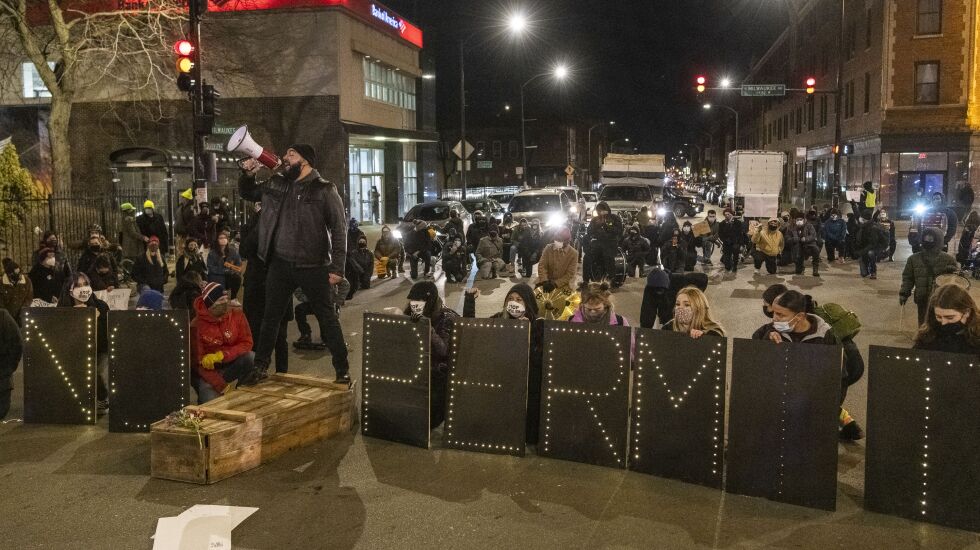
In her final days in office, Mayor Lori Lightfoot is trying to reach agreement with the Biden administration over fixes to city planning and zoning practices that federal investigators say are discriminatory.
An investigation by the U.S. Department of Housing and Urban Development concluded last summer that the city of Chicago has been relocating polluting businesses from white communities to Black and Latino neighborhoods, violating the civil rights of people living in those neighborhoods.
The probe was sparked by the planned relocation of the General Iron scrap metal operation to the Southeast Side.
HUD has struck similar agreements elsewhere, though often involving different types of housing discrimination. In 2019, the agency announced a 10-year agreement with Los Angeles to improve access for disabled residents in an affordable housing program.
The federal agency also has a second civil rights investigation underway that’s examining how members of the Chicago City Council have used their longstanding prerogative over their own wards and how that practice affects the placement of affordable housing in different parts of the city.
If a deal between HUD and Lightfoot on the General Iron investigation isn’t completed by the time she leaves office this month, it will be left to Mayor-elect Brandon Johnson to resume those talks after he takes office May 15. Johnson also will need to carry out whatever remedies are agreed on regarding planning and zoning practices.
Last year, HUD told Lightfoot the city’s land-use practices were unlawful and must be changed. Otherwise, Chicago stands to lose tens of millions of dollars a year in funding that goes toward social programs helping the city’s most vulnerable residents.
HUD’s investigation began in October 2020, spurred by three Southeast Side environmental groups’ complaint about the relocation of General Iron’s car-shredding operation from Lincoln Park to the Southeast Side. HUD said General Iron was one example of the city’s “long history of moving industrial uses to low-income communities of color,” overburdening those areas with polluters.
HUD released its findings last July, noting that former Mayor Rahm Emanuel’s administration pushed to relocate the scrap metal operation from 1909 N. Clifton Ave. so the 20 riverfront acres could be redeveloped as part of the multibillion-dollar Lincoln Yards development. General Iron ceased operations at the end of 2020 under an agreement with the Lightfoot administration.
That deal laid out a timeline for General Iron to shut down in Lincoln Park and move to East 116th Street along the Calumet River but did not include any requirement that the company take steps to control pollution, create jobs or otherwise benefit the Southeast Side, HUD found.
Yet the Emanuel and Lightfoot administrations both touted benefits to South Siders and said the business would be “state of the art.”
“The city produced no evidence that it even attempted to secure commitments,” HUD wrote, “on any features to benefit the Southeast neighborhoods.”
Early last year, the Lightfoot administration denied the last city operating permit needed for the relocated, rebuilt and rebranded scrap metal operation to open. The mayor has pointed to that as proof the city doesn’t discriminate.
It was a two-page document signed by City Hall’s top lawyer in 2019 that set in motion the metal shredder’s move to an area that’s more than 80% Black and Latino. The East Side, South Deering and Hegewisch community areas would experience the greatest impact from the operation, the city determined.
That agreement was key. Reserve Management Group, which had said in 2018 it would buy General Iron from the Labkon family, delayed finalizing the acquisition and move to the Southeast Side until it had a signed “term sheet” with the city in September 2019.
“We never would have closed on the General Iron assets without the agreement,” Steven Joseph, Reserve Management’s chief executive, said at a hearing in January.
Reserve Management is appealing the city decision on the permit through an administrative process. A ruling is expected in the coming weeks.
After initially signaling that she would fight HUD, Lightfoot softened that stance in October and agreed to begin negotiations. Now, she faces a deadline of May 12, her last day in office.
By striking a deal with HUD, Lightfoot can highlight efforts she made to address environmental racism in Chicago, including a broad study launched last year to identify cumulative burden of pollution in Chicago neighborhoods, particularly the South and West sides.
A City Hall spokesman declined to comment on the negotiations.
HUD says “negotiations are ongoing.”
Brett Chase’s reporting on the environment and public health is made possible by a grant from The Chicago Community Trust.







